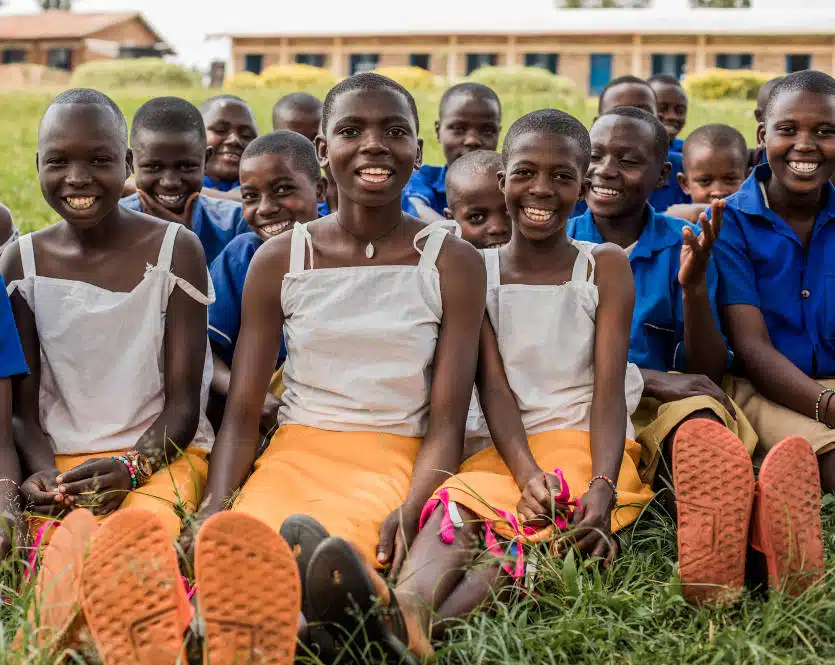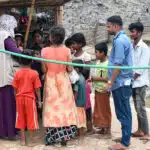Media Centre - Media release - 10 May 2023
Plan International Australia responds to the 2023 Australian Federal Budget

In response to tonight’s federal budget, handed down by Treasurer Jim Chalmers, Plan International Australia CEO Susanne Legena said:
‘Plan International Australia welcomes the Australian Government’s ongoing commitment to the foreign aid budget, particularly in the current fiscal environment. This is recognition of the critical role our international development program plays in supporting poverty alleviation and a peaceful and stable region. We also acknowledge that the Australian Government has stabilised the aid budget by locking in growth at 2.5% a year from 2026-2027. This is a very welcome step.
However, Australia must step up as a global leader. Australia’s current aid budget does not reflect the need driven by compounding crises: the pandemic has resulted in an increase in poverty, and widening inequality, particularly when it comes to gender equality. Children and young people, especially girls, are disproportionately impacted by multidimensional poverty, made worse by an increase in protracted crises, COVID-19 and climate related disasters.
Development assistance remains one of the most impactful investments alongside diplomatic efforts to influence and support equity, peace and economic development in the region and the world over – and we need a foreign aid budget that matches the growing need.
Our Official Development Assistance (ODA) budget continues to fall in real terms, and we are becoming less generous than other aid donors – in 2022, Australia’s donor ranking fell six places to 27th out of 30 OECD countries, and Defence spending is now a massive 12 times the amount we spend on aid.
We urge the Australian Government to commit to rebuilding the aid budget, by formalising a 10 year budget framework to rebuild ODA to reach 0.5% of Australia’s Gross National Income target.
Education in Emergencies
We are disappointed that the Australian Government has not include a pledge to Education Cannot Wait, the UN Global Fund for education in emergencies and protracted crises, in this year’s budget.
Education is a catalytic investment when it comes to alleviating poverty and progressing gender equality. For girls affected by crises, it is even more important; it provides protection, normalcy and a sense of hope for their futures. Despite this, there are 222 million children, over half of these girls, who are impacted by crisis globally and who are at risk of having their educations wiped out.
Plan International’s recent report, From Crisis to Classroom: Understanding the effects of disasters on girls’ access to education, found that 3.8 million children in the Pacific are at risk of losing access to their schooling due to climate-induced disasters, highlighting the urgent need for investment into education for children in humanitarian emergencies.
The Pacific is at the very “epicenter” of climate change. With tropical cyclones becoming more severe and intense, children are at heightened risk of being forced to leave school permanently. In the Pacific, girls’ completion rates of secondary school remain some of the worst in the world, and we are now at risk of a generation of girls being lost to secondary education. We simply cannot afford this.
There is an urgent need to invest in Education Cannot Wait, to ensure girls can realise their right to an education, especially when it is disrupted by circumstances outside of their control. We urge the Australian Government to join other donors such as the US, the EU, Canada, Germany, Italy, Spain and the UK and make a commitment to Education Cannot Wait.
Humanitarian Crises
It is disappointing that there is no further funding for the Humanitarian Emergency Fund, in this year’s budget, given the increasing number of people globally who need humanitarian assistance, and the disproportionate impact of these crises on adolescent girls.
These impacts include child marriage, which each year condemns 12 million more girls – half of the Australian population – to a daily existence of intimate partner violence, coercive control and marital rape; early pregnancy, which has become the leading global cause of death among 15–19-year-old girls; period poverty; female genital mutilation; lack of adolescent-responsive sexual and reproductive health information and services; and withdrawal from education at higher rates than their male peers.
The hunger crisis also continues to worsen, with 811 million people struggling to find food and 45 million children suffering from wasting, the most acute form of malnutrition.
Despite this, there is no additional funding for famine relief or humanitarian assistance.
The deadly violence and subsequent displacement that is rapidly escalating in Sudan right now is a prime example of why we must be supporting peace and development around the world. While we welcome the Australian Government’s announcement over the weekend of an initial $6 million in emergency funding to Sudan, we urge the Government to elevate this to $25 million in total to address the compounding insecurities Sudan faces on access to food, water, medicine and other essentials.
Australia is a richly diverse, multicultural country, and we are a generous people – so when we are witnessing heartbreaking images of refugees fleeing their homes and families having to make desperate, impossible decisions, Australians expect our government to be generous and to help these people in their time of need.
Alongside an increase in humanitarian funding, we urge the Australian Government to set a stand-alone target for all humanitarian assistance that at least 80 per cent of funding effectively address gender equality.
Gender equality
It is good news that the Australian Government will ensure that foreign aid investments valued at $3 million and above have a gender equality objective. We also acknowledge the Australian Government’s previous $3.5 million commitment to an Inclusion and Equality Fund to support LGBTIQ+ organisations.
Yet adolescent girls and gender diverse young people are still overlooked in Australia’s foreign aid budget – unseen, underfunded and in many ways, invisible. Less than 5 per cent of Australia’s aid program is directed towards programs that meet their specific needs. The Labor Government must ensure that funding for gender equality initiatives support these girls, or else risk an entire generation being lost to the ongoing shockwaves of the climate crisis, the pandemic, conflict and the cost of living crisis.
Climate change
We welcome the $142.2 million in funding allocated to climate change and the additional $36 million to Water for Women.
We also acknowledge the additional funding to the Pacific, some of which will be directed to a regional approach to humanitarian relief and disaster preparedness.
While we welcome this funding, we stress the need for inclusive and gender responsive climate adaptation and mitigation investments that centre the needs and leadership of girls and women, given the disproportionate impact it has on them.
[ENDS]
Media contacts


